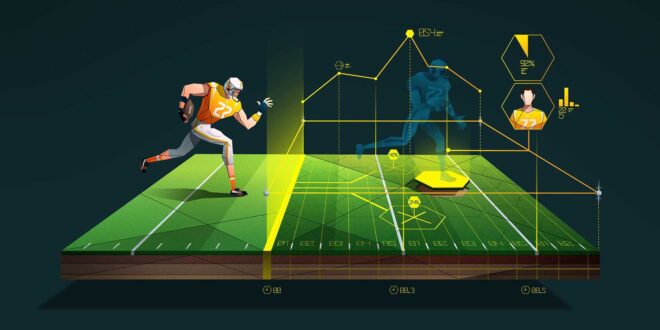Artificial intelligence (AI) has revolutionized many industries, and sports betting is no exception. AI algorithms are now being used to analyze data, identify patterns and trends, and make real-time adjustments to odds, resulting in improved accuracy in predictions. However, the use of AI in sports betting also raises ethical considerations, including the risk of gambling addiction and the potential for bias in data and decision-making. Despite these challenges, the future of sports betting is likely to involve an even greater role for AI.
Now that artificial intelligence is in vogue, due to its widespread use, we will see how it is being implemented in many countries where access to this technology is much lower. For example, in sites that discuss sports betting in Japanese, such as https://www.xn--24-fi4arbez1j4a3z.com/, we see that artificial intelligence and its application in betting have been mentioned for several years, although it may be something new for many countries. Other highly technological countries that have been using this type of technology in many industries, including the gaming industry, for years, is the United States. In any case, let’s see how artificial intelligence can be integrated into this sector and the advantages and risks associated with it.
What is artificial intelligence and how is it used in sports betting?

Artificial intelligence refers to the ability of computers to perform tasks that normally require human intelligence, such as problem-solving and decision-making. In sports betting, AI algorithms are used to analyze vast amounts of data, including past performance, team statistics, and player information. This information is used to identify patterns and trends that can be used to make more accurate predictions about the outcomes of sporting events. AI can also be used to make real-time adjustments to odds based on changing circumstances during a game or event.
Benefits of artificial intelligence in sports betting
The use of AI in sports betting offers several benefits, including improved accuracy in predictions, identification of patterns and trends, and real-time adjustment of odds. AI algorithms can analyze vast amounts of data more quickly and accurately than humans, making it easier to spot trends and patterns that would be difficult to detect manually. Real-time adjustments to odds can also be made based on changing circumstances during a game, resulting in a more dynamic and responsive betting experience for users.
Improved accuracy in predictions
One of the key benefits of using AI in sports betting is improved accuracy in predictions. AI algorithms can analyze vast amounts of data, including historical performance data, team statistics, and player information, to identify patterns and trends that can be used to make more accurate predictions about the outcomes of sporting events. This can give users an edge in making informed decisions about where to place their bets, increasing their chances of winning.
Identification of patterns and trends
AI algorithms are particularly well-suited to identifying patterns and trends in large data sets. In sports betting, this can be used to identify patterns in team performance, player statistics, and other factors that can affect the outcome of a sporting event. These patterns and trends can then be used to make more accurate predictions about the likely outcome of the event, giving users an edge in making informed betting decisions.
Real-time adjustment of odds
AI can also be used to make real-time adjustments to odds based on changing circumstances during a game or event. For example, if a team is performing better than expected, the odds of them winning may be adjusted to reflect this. This can create a more dynamic and responsive betting experience for users, as they can take advantage of changing circumstances to place bets that are more likely to pay off.
Examples of artificial intelligence use in sports betting

There are many examples of AI being used in sports betting today. One common application is in live betting, where AI algorithms can be used to make real-time adjustments to odds based on changing circumstances during a game. Another application is in result prediction, where AI can be used to analyze vast amounts of historical data to make more accurate predictions about the likely outcome of a sporting event.
Live betting and AI
Live betting is one area where AI is particularly well-suited to sports betting. AI algorithms can be used to make real-time adjustments to odds based on changing circumstances during a game or event. This means that users can take advantage of changes in the game to place bets that are more likely to pay off. For example, if a team is playing well and has a higher chance of winning, the odds of them winning may be adjusted to reflect this, allowing users to place bets on this outcome at more favorable odds.
Result Prediction and AI
Another area where AI is being used in sports betting is in result prediction. AI algorithms can analyze vast amounts of historical data to identify patterns and trends that can be used to make more accurate predictions about the likely outcome of a sporting event. This can give users an edge in making informed decisions about where to place their bets, increasing their chances of winning. However, it’s important to note that no prediction model is 100% accurate, and there will always be a degree of uncertainty and risk involved in sports betting.
Challenges and ethical considerations of artificial intelligence in sports betting
While the use of AI in sports betting offers many benefits, it also raises several challenges and ethical considerations. One of the main challenges is the risk of gambling addiction, as the use of AI can make it easier and more tempting for users to place bets. Another concern is the potential for bias in data and decision-making, as AI algorithms may be trained on biased data or make decisions based on incomplete or inaccurate information.
Risk of gambling addiction

One of the key ethical considerations of using AI in sports betting is the risk of gambling addiction. The use of AI can make it easier and more tempting for users to place bets, potentially leading to an increased risk of problem gambling. It’s important for sports betting platforms to take steps to promote responsible gambling, such as offering tools to help users set limits on their betting or providing resources for those who may be experiencing gambling-related harm.
Bias in data and decision making
Another potential concern with the use of AI in sports betting is the risk of bias in data and decision-making. AI algorithms may be trained on biased data or make decisions based on incomplete or inaccurate information, which can lead to unfair outcomes or perpetuate existing inequalities. It’s important for sports betting platforms to take steps to ensure that their AI algorithms are transparent and accountable, and to monitor their decision-making for potential biases.
Conclusion: The Future of Sports Betting With Artificial Intelligence
Despite the challenges and ethical considerations, the use of AI in sports betting is likely to become even more widespread in the future. AI algorithms offer a range of benefits, including improved accuracy in predictions, identification of patterns and trends, and real-time adjustment of odds. However, it’s important for sports betting platforms to be mindful of the potential risks and to take steps to promote responsible gambling and ensure transparency and accountability in their use of AI. By doing so, they can harness the power of AI to create a more dynamic and engaging sports betting experience for users.
 Imagup General Magazine 2024
Imagup General Magazine 2024



